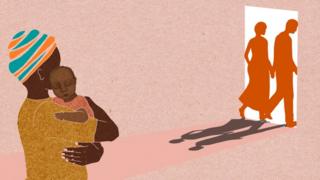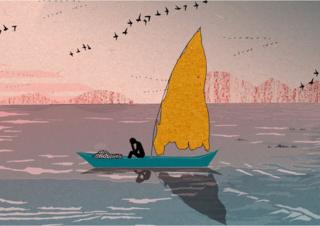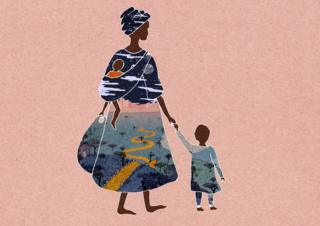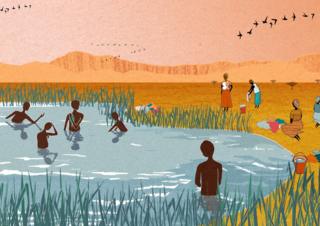The midwife who saved intersex babies
Five years ago a midwife in Kenya delivered a child with male and female sexual organs. The father told her to kill it, but instead she hid it and raised it as her own. Two years later, the same thing happened again – and before long she was forced to flee to save the children’s lives.
Zainab was used to delivering babies. As a traditional birth attendant in rural western Kenya, she’d delivered dozens over the years. But none like the one in front of her now.
It had been a tricky birth, but nothing Zainab couldn’t handle. The umbilical cord had got twisted around the baby’s head and she’d had to think quickly, using a wooden spoon to untangle it.
After clearing the baby’s airway, she washed the child and cut and tied the umbilical cord. It was then that Zainab saw something she’d never seen before.
“When I looked to see if it was a boy or a girl, I saw two things protruding – this baby had male and female parts,” she says.
Instead of saying what she usually said at this point – “It’s a boy!” or “It’s a girl!” – Zainab handed the baby to its mother and simply told her, “Here is your baby.”
When the exhausted mother saw that her child’s sex was unclear, she was stunned. But when her husband arrived, he was in no doubt about what should happen next.
“He told me, ‘We can’t take this baby home. We want this baby to be killed.’ I told him that the child was God’s creation and must not be killed. But he insisted. So eventually I told him, ‘Leave the baby with me, I’ll kill it for you.’ But I did not kill the baby. I kept it.”
The father came back several times to check that Zainab had done what she’d promised. She hid the baby and insisted she had killed it. But this would not work forever.
“A year later, the parents somehow heard that their baby was alive and came to see me,” Zainab says. “They told me I must never reveal that the baby was theirs. I agreed and since then I’ve been raising the child as my own.”
It was an extraordinary – and risky – choice.
In Zainab’s community, and in many others in Kenya, an intersex baby is seen as a bad omen, bringing a curse upon its family and neighbours. By adopting the child, Zainab flouted traditional beliefs and risked being blamed for any misfortune.
That was in 2012. But two years later Zainab was amazed to deliver a second intersex baby.
Although there are no reliable statistics on how many Kenyans are intersex, doctors believe the rate is the same as in other countries. Some estimates put this as high as 1.7% of the population but there is disagreement over what constitutes being intersex.
“This time, the parents didn’t ask me to kill the child. The mother was alone and she just fled and left me with the baby,” Zainab says.
Once again, she took the baby into her home and raised it as part of her family. But her husband – a fisherman on Lake Victoria – was not happy.
“When he went out to the lake to fish and had a bad catch, he blamed the children,” says Zainab.
“He said it was because they had brought a curse on us. He suggested I hand the children over to him so he could drown them in the lake. But I refused. I told him I would never allow that to happen. He became violent and we started fighting all the time.”
Zainab became so worried by her husband’s behaviour that she decided to leave him and take the children with her.
“It was a difficult choice for me because financially I had a comfortable life with my husband and we had grown-up children together and even grandchildren. But you can’t live in such an environment – with threats and fighting. I was forced to flee.”
Childbirth is changing in Kenya. Increasingly, mothers are giving birth in hospitals, rather than in the village. But not so long ago the use of traditional birth attendants was the norm, and there was a tacit assumption about how to deal with intersex babies.
“They used to kill them,” explains Seline Okiki, chairperson of the Ten Beloved Sisters, a group of traditional birth attendants, also from western Kenya.
“If an intersex baby was born, automatically it was seen as a curse and that baby was not allowed to live. It was expected that the traditional birth attendant would kill the child and tell the mother her baby was stillborn.”
In the Luo language, there was even a euphemism for how the baby was killed. Traditional birth attendants would say that they had “broken the sweet potato”. This meant they had used a hard sweet potato to damage the baby’s delicate skull.
“The parents did not get any say in the matter,” says the group secretary Anjeline Naloh. “The expectation was that the baby should not even live long enough to cry.”
These days, the Ten Beloved Sisters leave delivering babies to hospital midwives. Instead, they support expectant and new mothers and raise awareness about HIV transmission. But in more remote areas, where hospitals are hard to reach, traditional birth attendants still deliver babies the old-fashioned way and the Ten Beloved Sisters believe infanticide still happens.
“It is hidden. Not open as it was before,” says Anjeline Naloh.
“Those things still happen, but they are secrets now,” agrees Seline Okiki.
Find out more
“People bathe openly and if you see something that is a little different, that’s where they go speak: ‘Oh, did you see something, eh?’ [laughter]. You compare. That’s normal!”
Listen: BBC Africa health correspondent Anne Soy hears how it’s hard for intersex people to hide their condition
Coming out of the Shadows in Africa is broadcast on Assignment on the BBC World Service – click here for transmission times, or to catch up on the BBC iPlayer
Georgina Adhiambo, executive director of the charity Voices of Women in Western Kenya, which is making efforts to reduce the stigma that surrounds intersex people in western Kenya, says the subject is still taboo.
“We’ve come across parents who’ve tried to hide their intersex child or even locked them up – some because they were ashamed, others because they were afraid that others might try to harm their child,” she says.
“We’re explaining who intersex people really are. This is a very religious society, so we explain that intersex children are also created by God.”
But paediatric endocrinologist Joyce Mbogo – one of a new generation of doctors trained specifically to deal with what they call Disorders of Sex Development, or DSDs – says attitudes to intersex people are starting to change.
“We have a new set of parents who are willing to seek help,” she says. “The internet is accessible even in the rural areas, so when they realise there’s something wrong they’re able to look and see what could this possibly be.”
Treatment options vary. Some patients require no treatment, many need medication or hormone therapy and others need corrective surgery – though often this is delayed until after puberty so the children can decide for themselves who they want to be.
For Zainab’s adoptive children, such decisions are a long way off. They are healthy and happy and when she talks about them her face lights up. She’s visibly proud of them and the new life she’s built for herself. She still delivers babies when she’s needed, but makes her living mostly by buying and selling clothes and sandals.
“We all eat well and I can see that they are normal children. We talk, the older one helps with the household chores and my son thinks of them both as his siblings. They are all my family. It’s a miracle from God.”
When asked if she’s ever regretted her decision, Zainab laughs as if it’s a ridiculous question. “Should I throw them out? No, I’m their mum! They’re human beings and I have to take care of God’s creation.”
Illustrations by Charlotte Edey
Join the conversation – find us on Facebook, Instagram, Snapchat and Twitter.
Source: Read Full Article






